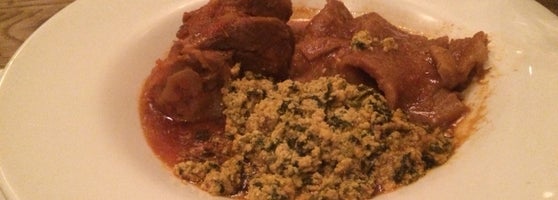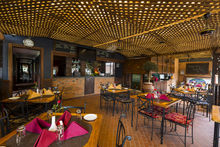

(West Africans love slimy sauces, but they are something of a challenge to eat: As you lift a spoonful, they snap back like rubber bands into the bowl.) Looking like fine scrambled eggs, it’s concocted of ground-up melon seeds, and is more mellow and less mucoidal than some of the other choices. The palava and gbegiri mentioned above are two examples, but egusi is really a better choice. Served separately, stew and mash is the most common Nigerian meal, often tendered with an extra sauce poured on top of the stew ($1 each) to provide textural contrast, though you can also have the sauces on the side. Two other stew options are available-chicken and fish-neither of which is as good as the goat. If you’re a newcomer to West African food, pick the fufu. In the traditional Nigerian fashion, we were offered a choice of “mashes” ($3) to go with the stew, which included fufu, amala (reconstituted yam flour, assuming a grayish-brown color), and eba (a fermented manioc-meal mash with a sour flavor).

Two shanks of strongly flavored meat rose up like rocky cliffs in the bowl with a mild tomato sauce splashing at their sides.

The brilliant yellow stodge flooded the shallow bowl, and a pair of Technicolor sauces had been chaotically spilled over the top: There was palava, a green slurry of shredded ewedu leaves displaying an intriguing sliminess, and gbegiri, locust beans puréed to the consistency of applesauce, flavored with tidbits of dried fish and tinted orange with palm oil.Īnother highlight was goat stew ($7). On that first visit, I fell in love with tuwo ($10, pronounced “toe”), a cornmeal porridge. The sole diner as we arrived was a woman eating fufu and stew, but later a group of 10 boisterous men in colorful caftans settled down to a leisurely and convivial meal. A narrow hallway leads past a kitchen to the rear dining room, which is sparsely decorated and contains only 10 tables despite its prodigious acreage if you’re tired of cramped restaurants, this is your place.
#Buka nigerian nyc license#
There’s a lounge up front with a comfy couch and bar, where a recently conferred liquor license makes Buka one of the few West African restaurants in town serving alcohol (most West African restaurants are run by observant Muslims). While the presence has been mainly limited to shipping companies, art galleries, and boutiques selling West African togs, in the ’80s there was a place called the Demu Café a few blocks west in Fort Greene, with a menu hilariously mixing bagels and fufu (white yam pounded to an elastic consistency).īuka’s premises are deep and high-ceilinged. Located in Clinton Hill, Buka (“Eating House”) is a new Nigerian restaurant on Fulton Street, but it certainly isn’t the first-there’s been a constant national presence on the thoroughfare going back 30 years, to the aftermath of that country’s oil boom and subsequent economic bust.


 0 kommentar(er)
0 kommentar(er)
